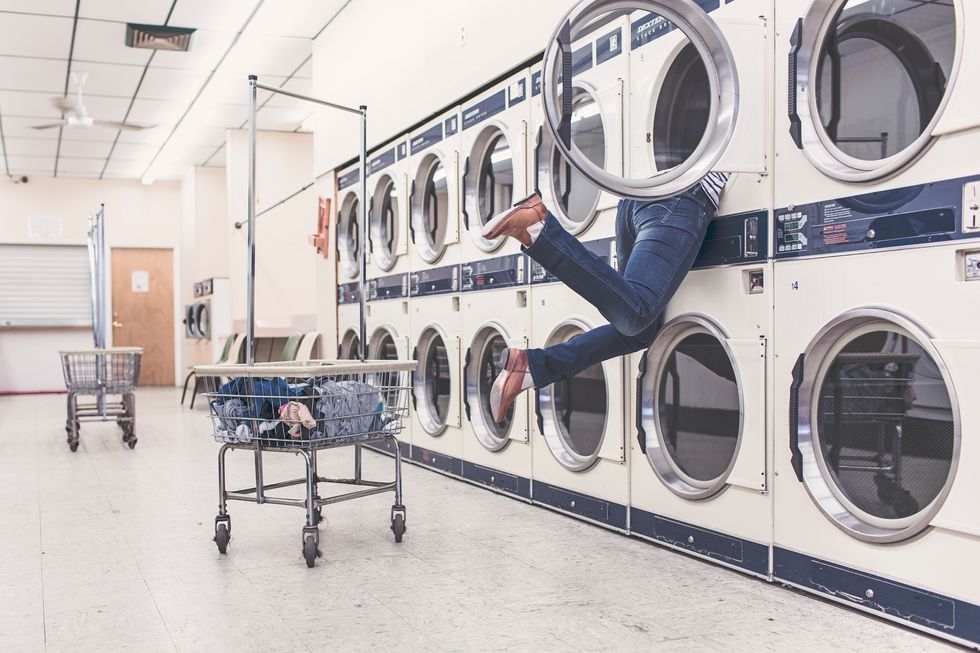My husband no longer hopes I’ll do the laundry.
Now, of course, I am immediately aware of the inherent benefits of such a reality. In no longer hoping I will do the laundry, my husband inadvertently frees me from the obligation, right? If there is no expectation, there is no burden. No harm, no foul.
But my husband and I didn’t get here because he was so generous as to have willingly freed me from the ills of this domestic duty. He didn’t just wake up one day and decide, “Alas! I love my wife too much to expect her to do the laundry!”
Nope.
My husband no longer hopes I’ll do the laundry…
…because I’m terrible at doing laundry.
My doing the laundry is literally a week-long affair be-speckled by convenient diversions, complaining, monologuing and metaphorical declarations of laundry’s detriment to the world.
I am dramatic when I do the laundry— and slow, and avoidant. And so my husband often ends up (precious soul that he is) finishing the laundry I’ve started in order to avoid having to listen to yet another litany of sighing as I angrily flop our clothes into a folded pile.
But as comedic as this may all sound, having a husband who no longer hopes you’ll help with the laundry is depressing. Last week, when he finally told me he no longer hopes to get a laundry partner out of me, my husband also explained that he had trouble trusting that I’ll actually finish the laundry when I start it or that I will help with it when he starts it. All my diverting, complaining, monologuing and declaring had effectively changed his view of my character.
There is something incredibly just about my husband’s loss of hope. In fact, when you think about it, his loss of hope is outright self-protective! Why would he get his hopes up that I’ll help him with the laundry if I haven’t proven myself in the past?
Hope in anything brings along with it a statement of truth about the thing hoped for. Hope declares that expecting a certain outcome isn’t shameful or vain because the thing hoped for is good for and worthy of the investment hope makes.
Consequently, Hope teaches us rather effectively that investing expectation in the untrustworthy is foolish. We should not hope that the iron boat will float. We should not hope that the paper chair will support our weight.
And we usually don’t.
Last week, I learned that the other side of hope is the truth about its object. Only that which consistently produces Good, that which has proven that it can meet the expectation of one’s optimism, sufficiently upholds the weight of hope.
And hope’s absence? Hope’s absence is an undeniably abrasive indictment.
Hope removed is trustworthiness contested.
This week, the fuel of a husband’s lost hope in his wife was enough to propel me out of inertia’s grip and into the utility room of our apartment. I am happy to say that I started and helped complete the laundry without any diverting, complaining or monologuing… and in just one day.
As I look back at the debris of my collision with lost hope, I can’t help but wonder about Hope’s unrightfully abandoned. In a world beset by unruly, disordered arrangements, there is that which has proven it consistently produces Good. There is that which meets the expectation of all optimism without ever earning the hope of even the most hopeful.
When the hope-worthy is denied its due, Truth and a sound memory become the perfect remedies. We must always seek the truth about that for which we hope and persistently recall the validity of claims about its trustworthiness. In this, we unceasingly commit ourselves to testing our hope— and the absence thereof— against the character of its object. And we grow more and more skilled in avoiding the folly of vain anticipation.
5 Therefore, since we have been justified through faith, we have peace with God through our Lord Jesus Christ, 2 through whom we have gained access by faith into this grace in which we now stand. And we boast in the hope of the glory of God. 3 Not only so, but we also glory in our sufferings, because we know that suffering produces perseverance; 4 perseverance, character; and character, hope.5 And hope does not put us to shame, because God’s love has been poured out into our hearts through the Holy Spirit, who has been given to us.6 You see, at just the right time, when we were still powerless, Christ died for the ungodly. 7 Very rarely will anyone die for a righteous person, though for a good person someone might possibly dare to die. 8 But God demonstrates his own love for us in this: While we were still sinners, Christ died for us.
(Romans 5:1-8 NIV)
~ Inspired by Adrienne ~
Originally published on Medium.com.
















